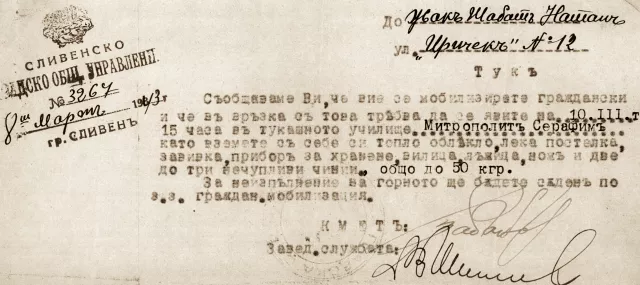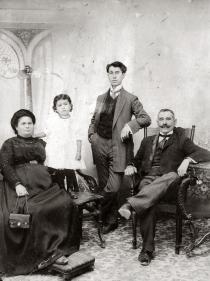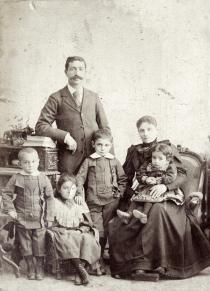Deportation document
This document was sent to my father Jack Natan in 1943 and said that he should show up for deportation.
The serious manifestations of anti-Semitism began when the anti-Jewish laws were adopted [the so-called Law for the Protection of the Nation] in Bulgaria. That happened in 1940-1941. The first real and tangible shock for us, as laws themselves are something abstract, was the introduction of the yellow stars. It was followed by the prohibition to live in the center of Sofia and the changing of our names. The aim was to restrict us through our specific biblical names. My father was called Jacob instead of Jack, my mother Malkuna instead of Malka, and my name became Delila instead of Linka. Then came the marking of the Jewish houses and finally our internment from Sofia. The most awful thing was that constant feeling of vulnerability - that there was always a chance that a Legionary or Brannik would insult you or do whatever he would want to you, without you being able to protect yourself.
My father was forced to quit his job in the Carmel Bank. Then it was announced that if we leave the city voluntarily, we would obtain the right to choose our new home freely. As my father had many friends in Sliven, where he had grown up, we settled there shortly before the big wave of internment, and were thus able to take things from our household with us. My father remained unemployed - he was forbidden to work in the banking system. He did some underground work for a couple of friends, although he was formally hired as a laborer so that they could pay him. Again, we had financial problems in Sliven. During vacations I also started working in a factory in order to make both ends meet. I worked on a knitting-frame for socks.
There was no physical repression against us but moral violence in terms of the offences we had to endure from legionnaires and branniks. At the same time I have wonderful memories from my contacts with Bulgarians. We stayed in Sliven until December 1944. We went through the hardest moments there in 1943, when my father received a notice that he should show up with some 50 kilos of luggage at the school. The letter was from 8th March 1943, and the date appointed for showing up was 3pm on 10th March. We all knew that it meant internment or even deportation. We also knew that the lists of women and children were in the municipality, and they were about to be announced. I was a member of the underground UYW. I discussed the possibility of not showing up with my fellow members but finding a connection with the partisans instead and joining them in the Balkan Mountains. But as we were very young and lacked experience - I was only 17 - they weren't very interested to accept us because we might have become a burden to them.
Anyway, nothing happened. In the last moment, at 11am on 10th March, the abrogation of the internment came [on 24th May 1943] and we were informed that no one had to show up. I remember complete strangers who, seeing my yellow star, were warmly embracing and kissing me in the streets of Sliven. My father didn't go to labor camps, as he was already too old.

















